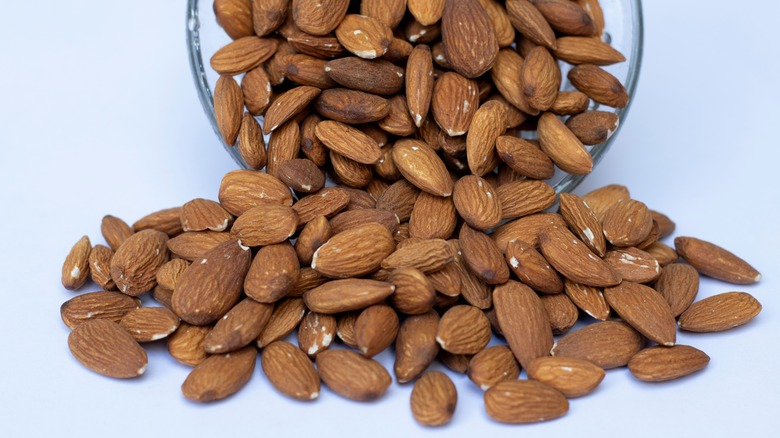Can You Eat Almonds While Pregnant?
There are so many false pregnancy myths, though some may seem outlandish — think how it's still a common belief that you can tell the sex of your baby by the shape of your bump. (via BBC). When it comes to the safety of your growing baby, you can never be too safe. It's wise to look into your daily habits and food and movement choices to ensure that what you're doing is indeed safe. In our ever-changing hyper-vigilant world, even foods that are typically known to be nutritious and healthy can get a bad rap.
For example, if someone asks you whether almonds are a healthy food, it's basically a no-brainer to immediately say yes. Then if asked about how they affect pregnancy, you might not be entirely so sure. Even things like using an electric blanket or getting a dental x-ray have the potential to affect a growing fetus. Interestingly, common foods such as fish, cheeses, and meats should be avoided when pregnant (via All About Women Obstetrics and Gynecology).
Here's what you need to know about eating almonds during pregnancy.
The myth about almonds and pregnancy
According to the Mayo Clinic, nuts have become an increasingly more widespread source of allergy in children in recent years and consequently, pregnant women have become a bit concerned about consuming them during pregnancy out of fear of making their growing baby allergic to them. Yet that notion is a myth.
"Mothers should not be fearful of eating certain foods and should go on with their regular cravings and their regular diets and not avoid things to try to protect their child from allergy," pediatrician Dr. Ruchi Gupta tells WebMD. In fact, eating nuts may help prevent their children from becoming allergic since they're being exposed so early on. This same theory has been linked to other common allergies as well. Gupta notes that other food children are most commonly allergic to include milk, eggs, tree nuts, shellfish, fin fish, wheat, and soy.
Almonds can boost baby's brain health
As long as you aren't allergic to almonds yourself, it's a great idea to include them in your diet when pregnant. A study from the Barcelona Institute for Global Health suggests that consuming just 90 grams (an average of three handfuls) of nuts a week, including almonds, walnuts, and hazelnuts results in better attention and thinking, and memory skills in the child (via Science Daily).
Researcher and author of the study, Florence Gignac explains to Science Daily, "We think that the beneficial effects observed might be due to the fact that the nuts provided high levels of folic acid and, in particular, essential fatty acids like omega-3 and omega-6." Gignac continued, "These components tend to accumulate in neural tissue, particularly in the frontal areas of the brain, which influence memory and executive functions."
In addition, almonds contain a wealth of health benefits such as magnesium, riboflavin, and polyunsaturated fatty acids (via SF Gate). Riboflavin helps guard against preeclampsia, and magnesium boosts embryonic development. Besides the polyunsaturated fatty acids aiding in your baby's brain development, almonds also help lower your cholesterol and boost metabolism.


